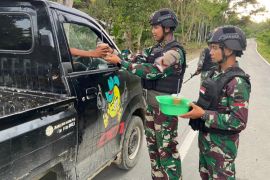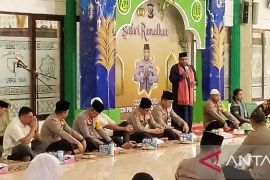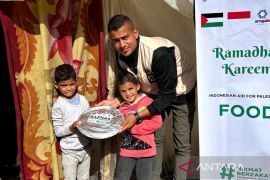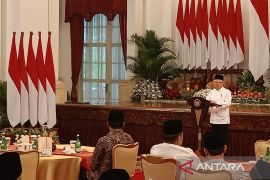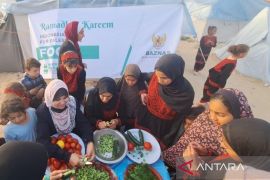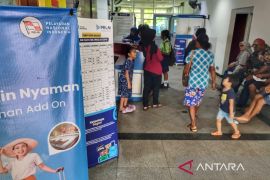Besides, the government is also planning to increase the beef reference price from the current Rp76,000 per kg to Rp85,000 per kg, in an effort to help cattle farmers obtain incentives, so that they can raise pedigree and feedlot cows.
However, in anticipation of the fasting month of Ramadan, the price of meat has been increasing and is expected to reach between Rp100 thousand and Rp130 thousands per kg in a number of provinces. Though, in several other regions, the price of beef is reportedly still stable.
Therefore, the government is preparing about 170 thousands of cattle to meet the need for beef during the fasting month which begins on Sunday, June 29, 2014 (the countrys second largest Muslim organization has started fasting on Saturday, June 28).
Agriculture Minister Suswono, during a visit to West Java on Wednesday, expressed his confidence that the need for meat during the fasting month would be met. With a stock of 170,000 heads of cows, supplies of meat during the fasting month and the Lebaran festivities will be adequate.
"Therefore, we appeal to the public not to panic and rush to the market to purchase meat exceeding their daily needs. Panic buying will only scale up prices. The public should, therefore, purchase beef based on their daily needs," the agriculture minister said when visiting the Caringin Wholesale Market in Bandung, West Java, on Wednesday last week.
The actual food stocks in the current fasting month were adequate so prices were still inclined to be stable, he said.
There was even an indication that meat prices had gone down from Rp90,000 per kg to Rp86,000 per kg, the minister claimed.
After all, the government is planning to increase its meat reference price from the current level of Rp76,000 per kg to Rp85,000 per kg. The current level of Rp76,000 per kg was decided in 2013 through the Trade Ministers decree No.46/M-DAG/KEP/8/2013.
"The current reference price is Rp76.000 per kg. That was decided when the rupiah exchange rate was still Rp9,000 per US dollar. At present, I want the price of meat to be set at Rp85,000 per kg," Trade Minister Muhammad Lutfi said at his office in Jakarta on Friday.
Lutfi said that with a government-sanctioned price of Rp85,000 per kg, cattle breeders would be able to obtain incentives which they could use to increase investment, particularly in the feedlot cow business.
"I am afraid the price will drop to a level below Rp85,000 per kg if the government does not take a policy decision and coordinate with the Agriculture Ministry. This would discourage breeders and there would be no more parties raising cattle. If this happens, everyone will only import the meat and the country will then depend on imports," Minister Lutfi added.
The government-sanctioned price would serve as a reference for the government to carry out feedlot and imports of slaughter cows, he said.
In the previous ruling, the government had allowed cattle imports if the price of beef at home was over the reference price of Rp76,000 per kg.
In the trade ministers decree in 2013, it was mentioned that the import of the needed beef or cattle should be about 80 percent of the one year approved accumulative import volume.
Virtually, particularly in the face of the fasting month, the price of beef across the country has increased, though in some regions meat prices are still stable.
Some regions needed increased stocks of a number of food products like soybean and beef, agriculture minister Suswono admitted.
Regarding the price of beef, which could be increasing, the agriculture minister said that the ideal price of beef now was about Rp86,000 per kg. If the price goes lower than that, it would affect breeders and that they would no longer be encouraged to run their cattle ranches.
Beef prices in a number of regions in the face of the fasting month have increased in a range of about Rp100,000 and Rp130,000 per kg.
The highest price was found in Aceh Province, where a kilogram of meat is sold at Rp130,000.
The price of beef had increased and was expected to reach a range of Rp110,000 and Rp130,000 per kg, said Sofyanuddin, head of the Trade, Industry and Cooperatives Service of Aceh, on Thursday.
The price of meat on regular days was set at Rp80,000 and Rp90,000 per kg only, he disclosed.
"The price of beef always increases before the fasting month. It is caused by high demand," said Sofyanuddin.
Meat in the Sumatran province of Bengkulu, particularly in the district of Rejanglebong, has also increased from about Rp95,000 to Rp110,000 per kg.
"Beef prices have, in the past several days, risen from Rp95,000 to Rp110,000 per kg," said Atik (35), a resident of Air Bang Housing complex, Curup Tengah sub-district, on Wednesday.
The same increase also takes place in North Sumatra.
Traders at Pasar Simpang Limun in Medan, the capital city of North Sumatra province, said prices had gone up by about Rp5,000 per kg.
"It has increased by Rp5,000 per kg. Last week it was still Rp95,000 per kg but now it has reached Rp100,000 per kg. Possibly, it will rise to Rp110,000, next week," M Yusuf, a trader in Simpang Limun Market, said on Thursday.
However it was reported that the price of meat in several other regions such as in Malang, East Java, and Sawahlunto, West Sumatra, was still stable.
There would be no increase in meat prices during the fasting month and the Lebaran festivities, Director of Malangs Slaughter House Djoko Sudadi assured, adding that cow stocks were adequate in Malang.
He said that the price of imported beef, which was previously set at Rp90,000 per kg, had even gone down to Rp86,000 per kg. The price of local beef is still at a range of RpRp88,000 and Rp90,000 per kg.
In Sawahlunto, the price of beef is Rp100,000 per kg, but is still considered stable.
"The price does not increase before Ramadan. It is stable at Rp100,000 per kg," said trader Iskandar in Sawahlunto on Thursday. (*)
(T.A014/INE/B003)
Reporter: Andi Abdussalam
Editor: Fardah Assegaf
Copyright © ANTARA 2014


